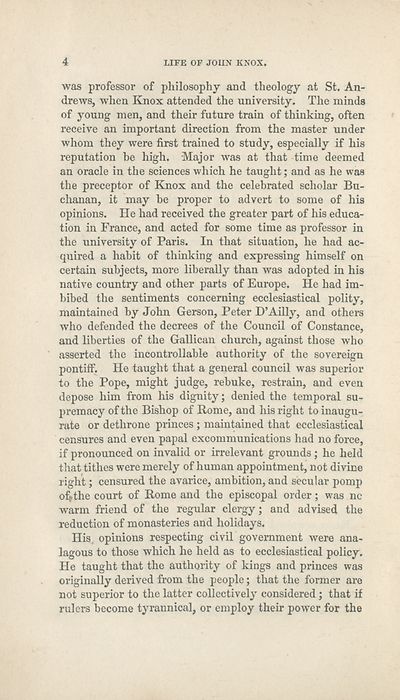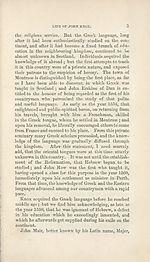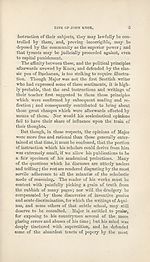Download files
Complete book:
Individual page:
Thumbnail gallery: Grid view | List view

LIFE OF JOIIN KNOX.
was professor of philosophy and theology at St. An¬
drews, when Knox attended the university. The minds
of young men, and their future train of thinking, often
receive an important direction from the master under
whom they were first trained to study, especially if his
reputation he high. Major was at that time deemed
an oracle in the sciences which he taught; and as he was
the preceptor of Knox and the celebrated scholar Bu¬
chanan, it may he proper to advert to some of his
opinions. He had received the greater part of his educa¬
tion in France, and acted for some time as professor in
the university of Paris. In that situation, he had ac¬
quired a habit of thinking and expressing himself on
certain subjects, more liberally than was adopted in his
native country and other parts of Europe. He had im¬
bibed the sentiments concerning ecclesiastical polity,
maintained by John Gerson, Peter D’Ailly, and others
who defended the decrees of the Council of Constance,
and liberties of the Gallican church, against those who
asserted the incontrollable authority of the sovereign
pontiff. He taught that a general council was superior
to the Pope, might judge, rebuke, restrain, and even
depose him from his dignity; denied the temporal su¬
premacy of the Bishop of Rome, and his right to inaugu¬
rate or dethrone princes ; maintained that ecclesiastical
censures and even papal excommunications had no force,
if pronounced on invalid or irrelevant grounds; he held
that tithes were merely of human appointment, not divine
right; censured the avarice, ambition, and secular pomp
ofithe court of Rome and the episcopal order; was nc
warm friend of the regular clergy; and advised the
reduction of monasteries and holidays.
His. opinions respecting civil government were ana-
lagous to those which he held as to ecclesiastical policy.
He taught that the authority of kings and princes was
originally derived from the people; that the former are
not superior to the latter collectively considered; that if
rulers become tyrannical, or employ their power for the
was professor of philosophy and theology at St. An¬
drews, when Knox attended the university. The minds
of young men, and their future train of thinking, often
receive an important direction from the master under
whom they were first trained to study, especially if his
reputation he high. Major was at that time deemed
an oracle in the sciences which he taught; and as he was
the preceptor of Knox and the celebrated scholar Bu¬
chanan, it may he proper to advert to some of his
opinions. He had received the greater part of his educa¬
tion in France, and acted for some time as professor in
the university of Paris. In that situation, he had ac¬
quired a habit of thinking and expressing himself on
certain subjects, more liberally than was adopted in his
native country and other parts of Europe. He had im¬
bibed the sentiments concerning ecclesiastical polity,
maintained by John Gerson, Peter D’Ailly, and others
who defended the decrees of the Council of Constance,
and liberties of the Gallican church, against those who
asserted the incontrollable authority of the sovereign
pontiff. He taught that a general council was superior
to the Pope, might judge, rebuke, restrain, and even
depose him from his dignity; denied the temporal su¬
premacy of the Bishop of Rome, and his right to inaugu¬
rate or dethrone princes ; maintained that ecclesiastical
censures and even papal excommunications had no force,
if pronounced on invalid or irrelevant grounds; he held
that tithes were merely of human appointment, not divine
right; censured the avarice, ambition, and secular pomp
ofithe court of Rome and the episcopal order; was nc
warm friend of the regular clergy; and advised the
reduction of monasteries and holidays.
His. opinions respecting civil government were ana-
lagous to those which he held as to ecclesiastical policy.
He taught that the authority of kings and princes was
originally derived from the people; that the former are
not superior to the latter collectively considered; that if
rulers become tyrannical, or employ their power for the
Set display mode to:
![]() Universal Viewer |
Universal Viewer | ![]() Mirador |
Large image | Transcription
Mirador |
Large image | Transcription
| Antiquarian books of Scotland > Scotland/Scots > Life of John Knox ; and, The life of Alexander Henderson > (22) |
|---|
| Permanent URL | https://digital.nls.uk/131832568 |
|---|
| Description | Thousands of printed books from the Antiquarian Books of Scotland collection which dates from 1641 to the 1980s. The collection consists of 14,800 books which were published in Scotland or have a Scottish connection, e.g. through the author, printer or owner. Subjects covered include sport, education, diseases, adventure, occupations, Jacobites, politics and religion. Among the 29 languages represented are English, Gaelic, Italian, French, Russian and Swedish. |
|---|

